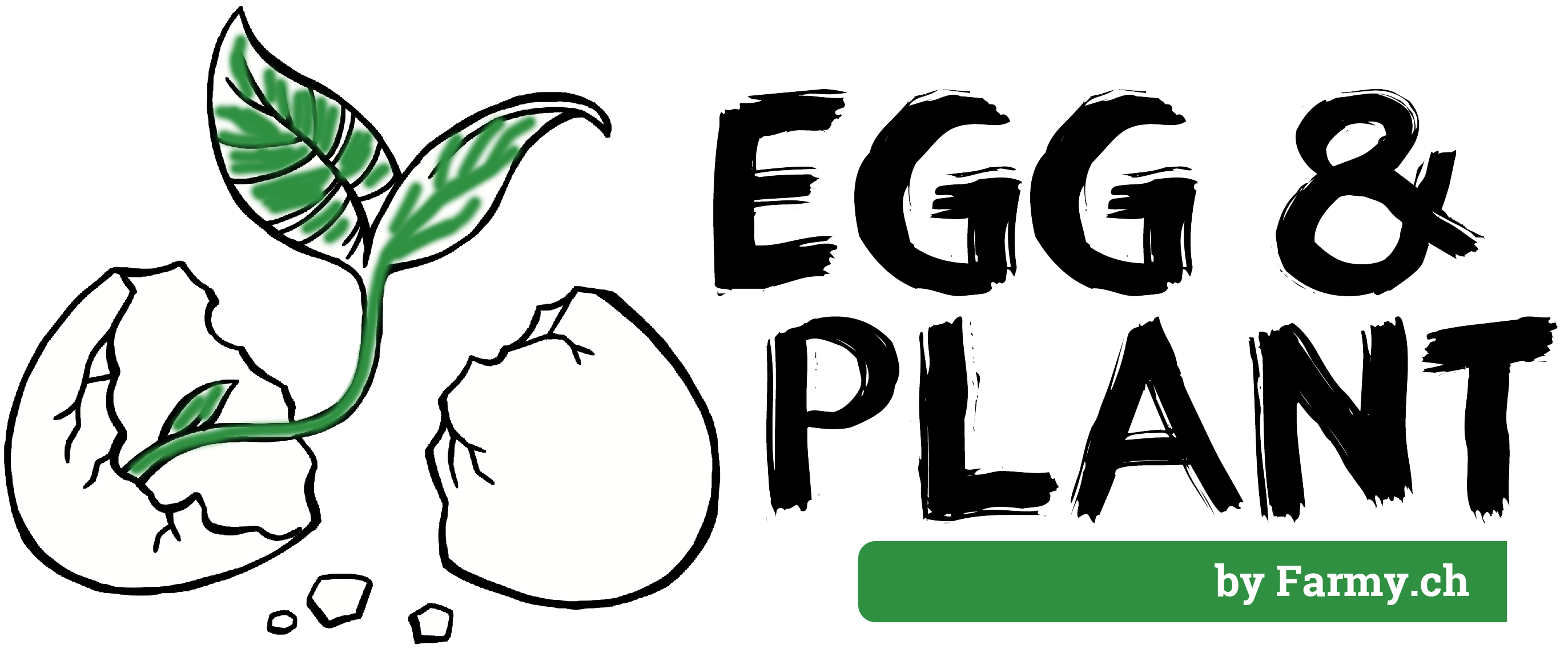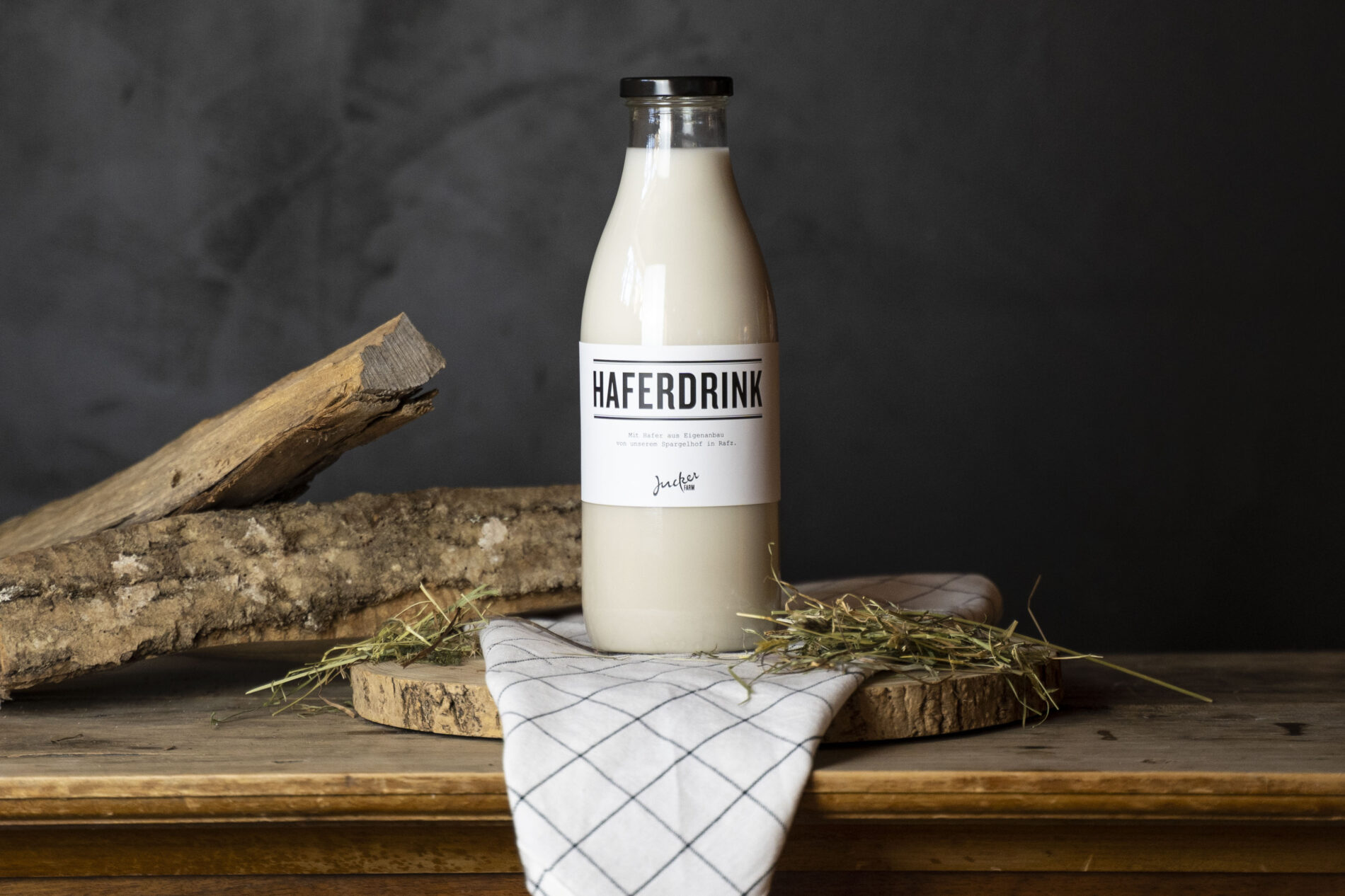The mission: to produce the healthiest, most sustainable and best oat drink in Switzerland. Did our producer, Jucker Farm, succeed? We were given the opportunity to take a closer look at the oat drink and the production process at their official oat drink event at the Bächlihof in Jona.
The magic of production
Since November 2021, the first Swiss oat drink from the farm can be enjoyed – namely from the Jucker Farm. This was preceded by a period of experimentation and tinkering. At the time of the event, for example, the oat drink was still being produced with a small rental machine with which a lot of development work was done. Large-scale production will soon begin with a larger machine.
Here, the Jucker Farm conjures up its oat drink from oat flour, water, rapeseed oil, enzymes and salt. But it is not as simple as it sounds! The oat flour is first mixed with water and then heated. Enzymes are the magic ingredient here. They ensure that the starch in the oat flour is broken down. This produces natural sugar, which also gives the oat drink its sweetness.

Then the suspended matter of the oatmeal is separated from the resulting liquid, the whole thing is homogenised, pasteurised and then bottled, sealed by hand and shock-cooled. Last but not least, the labels are applied.
And so it takes about 5 hours to produce one batch of oat drink. About 500 litres of oat milk can be produced daily. (You can find a detailed description of the production process here (German source).)
But now the tinkering is done for the time being. The real machine is already ready and will soon be put into operation. And it’s got what it takes! Unlike the experimental machine, it can produce up to 1000 litres of oat drink per day. Thanks to a heat exchanger in the plant, the heat generated here can be optimally used and recovered. This saves heating energy. In the future, solar power will also be added.
And yet the production of the Jucker Farm oat drink is extremely laborious. Why is that? Because the raw material from which it is made, oats, comes from regenerative agriculture.
Regenerative Swiss agriculture
First things first: unlike the conventional focus on protecting plants, regenerative agriculture places its emphasis on the soil. As Sven, head of the Bächlihof and farmer, explains to us: “Healthy food only grows on healthy soil.”
So in general, running a regenerative agriculture means that the soil is
- permanently covered,
- always thoroughly rooted,
- only minimally disturbed (i.e. hardly any pesticides, artificial fertilisers or ploughing).
In addition, biodiversity is promoted, which requires as little chemical plant protection as possible. Animals are also integrated. This means, for example, that the undersowing (a seed under the main seed, which only really blossoms after the latter has been harvested. This counteracts erosion of the soil, as it is always protected from wind and rain. Read more here (German source)), is used as goose pasture at their farm in Rafz. These in turn fertilise the soil. In addition, the filtered-out oat paste left over from the production of the oat drink is used to make animal feed or is returned to the fields.
A forgotten farming method
As indicated above, the concept of regenerative agriculture also influenced the creation of the oat drink. This is because the Jucker Farm has set itself the goal of pesticide-free production on their entire farm, where they also grow fruit and vegetables, by 2030 – well above the standard of organic at that. They have already achieved this with their oat drink. But even that was a challenge!

Firstly, no oats have been grown for human consumption in Switzerland for a long time. So the necessary knowledge for this has been almost completely lost. This is because oats are now mainly grown for animal feed. “I really read up on it in old books,” Sven tells us.
That said, oats are extremely suitable for pesticide-free production because they are so robust and not very susceptible to weeds! What is added to the Jucker Farm’s cultivation are two very special products: Terra Preta and compost tea.
Ancient manure
It sounds a bit mysterious. In fact, Terra Preta is black, extremely nutrient-rich soil that originated in the Amazon. This mixture of plant waste, burnt wood and microorganisms, which is left for 6-8 weeks, can be used excellently as a natural fertiliser and is produced by the Jucker Farm itself.
“The amount of work involved is gigantic,” says Sven. Indeed, much more of the Terra Preta is needed in terms of quantity than when artificial fertiliser is used. On the other hand, the black soil has a more sustainable effect: it builds up the soil and continues to give nutrients to the plants that grow on it for years.
Healthy food only grows on healthy soil.
Sven Studer, head of Bächlihof & farmer
Terra Preta is combined with compost tea, a natural plant strengthening agent. For this, water is rotated for 2 days and thus “aerated”. This makes it more compatible with the plants. Then a compost mixture of sugar molasses, salt and lime is added, the whole thing is heated to 24 degrees and then stirred for another 48 hours. This increases the microorganisms from the compost. Pathogens hardly have a chance.
So the production of the compost tea also requires a lot of work. But for the Jucker Farm, this – and above all the Terra Preta – has proven to be extremely beneficial.
This is what makes Jucker Farm’s oat drink so special
As we have seen above, Jucker Farm’s oat drink is not only pesticide-free, but is also produced in a regenerative farming system. So it’s produced as naturally as possible.
This also means that there are no preservatives, added sugar or the like in it. And, of course, that the ingredients come from regional agriculture.

The fact that the oat drink is only pasteurised and not UHT-heated also makes it fresher. After all, it is only heated to between 60 and a maximum of 90 degrees. This gives the oat drink a shelf life of just under 3 weeks. By comparison, UHT products are heated to 135 to 155 degrees.
Finally, the oat drink also scores points in terms of CO2: since it is produced in the farm’s own factory with its own oats, on top of being plant-based, less CO2 is produced. The packaging is moreover made of glass.
And the fact that it can also be foamed is the cherry on top!
Conclusion
You can really say that the Jucker Farm spares no effort to make their oat drink as sustainable as possible. The fact that their milk alternative can be combined with the goal of sustainable, regenerative agriculture makes us pretty happy!
Of course, there is also room for improvement. For example, the glass could be reused (more on that here (German source)). But all in all, we can only applaud what the Jucker Farm has achieved with its oat drink and what it plans to do in the future. We are looking forward to further developments.
Our special thanks go to Nadine Gloor, Thomas Dietiker, Sven Studer, Nik Fehlmann and the rest of the Jucker Farm team who made the oat drink event possible.











What do you think?